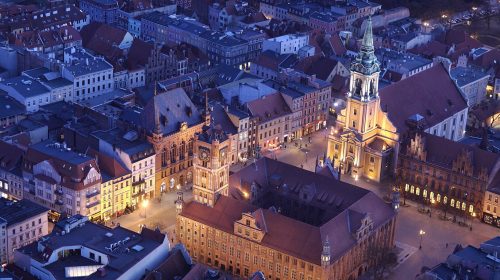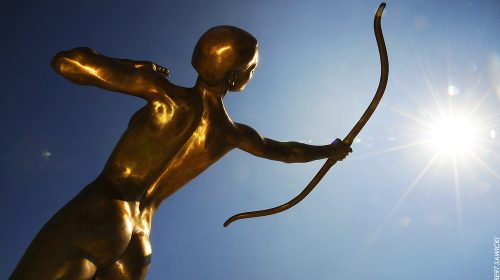Adrianna Biedrzyńska was born on 30 March 1962 in Toruń. She is a Polish stage, film, and television actress, and singer. She graduated from Primary School No. 50 and Secondary School No. 6 in Bydgoszcz. She is also an alumna of the Acting Department of the Film School in Łódź.
Initially, Ms Biedrzyńska intended to become a violinist, but she changed her plans and chose an acting career instead. She has played in numerous films, television series, and theatre plays. She has also tried her hand at singing, and released an album entitled Ada – Debiut in 2003.
She debuted as a stage actress while still a student at the Film School – in 1983, she performed for the first time at the Julian Tuwim Studyjny Theatre in Łódź. She worked full time at the Nowy Theatre in Warsaw and other theatres, and also appeared as a guest actress on various stages in the capital – the Rampa Theatre, the Scena Prezentacje Theatre, the Syrena Theatre, and the Komedia Theatre.
In the second half of the 1980s, she decided to give up her stage career and concentrate on films.
Ms Biedrzyńska’s screen debut came in 1983, when she played a bit part in Co dzień bliżej nieba/Closer to the Sky Every Day, by Zbigniew Kuźmiński. A year later, she was cast as the female lead in a musical drama film Miłość z listy przebojów/Love from the Charts by Marek Nowicki, and became recognizable as an artiste. Her next picture was Ucieczka/The Escape, by Tomasz Szadkowski; for this performance, she received an award at the Young Polish Cinema Festival in Gdańsk.
In 1985, she started acting in foreign pictures, such as Kepvadaszok/The Picture Hunters, by András and Miklós Szurdi, a Czech-Finnish film entitled Zkroceni zleho Muze/The Taming of the Shrewish Man, by Marie Polednakova, a German-Hungarian picture Hanussen, by Istvan Szabo (1988), in which her co-star was renowned actor Klaus Maria Brandauer, and also in the debut movie of French-Iranian director Emily Atef entitled Molly’s Way, which won the audience’s and critics’ hearts at festivals in many cities, including Bratislava, Munich, Nuremberg and Bogota.
In 1988, Adrianna was cast in the leading role in Dekalog IV/Decalogue Four, by Krzysztof Kieślowski, where she portrayed Anka, a 20-year-old student at the Academy of Dramatic Art in Warsaw. In the same year she also starred in Niezwykła Podróż Baltazara Kobera/The Tribulations of Balthazar Kober, by Wojciech Has. She also played a journalist in a critically acclaimed drama film entitled 300 mil do nieba/300 Miles to Heaven (1989), directed by Maciej Dejczer, which won many accolades, including the European Film Award for the Young European Film of the Year and the Young Jury Award at the Cannes Film Festival. She subsequently starred in Lepiej być piękną i bogatą/It is Better to be Beautiful and Rich, by Filip Bajon, and in Pajęczarki/Spider Women, by Barbara Sass. In the Andrzej Wajda picture entitled Pierścionek z orłem w koronie/The Ring with a Crowned Eagle, she created the superb character of Janina, a Wartime nurse.
In 2003, she released an album entitled Ada – Debiut.
She also starred in the first Polish soap operas and sitcoms, such as Fitness Club, Buła i spóła/Buła and the Gang and Barwy Szczęścia/The Colours of Happiness. For many years, Ms Biedrzyńska enjoyed great success while performing at the Television Theatre, and also cooperated with the TEY cabaret and Paweł Dłużewski, a stand-up comedian.
In a movie created in 2016 by Marzena Więcek – a cinematic polyptych of sorts – in which female actresses describe the most-crucial moments in their lives, Adrianna Biedrzyńska played one of the leading roles, alongside other Polish actresses such as Ewa Szykulska and Marzena Trybała.
The picture received numerous foreign awards, for instance at the film festivals in Singapore, Malta and Dhaka.
Selected filmography
- 1983 – „Co dzień bliżej nieba”/„Closer to the Sky Every Day” dir. Zbigniew Kuźmiński
- 1984 – „Miłość z listy przebojów”/„Love from the Charts” dir. Marek Nowicki
- 1986 – „Kepvadaszok”/„The Picture Hunters” dir. András Szurdi, Miklós Szurdi
- 1986 – „Boris Godunow”/„Boris Godunov” dir. Siergiej Bondarczuk
- 1988 – „Schodami w górę, schodami w dół”/„Upstairs, Downstairs” dir. Andrzej Domalik
- 1988 – „Hanussen” dir. Istvan Szabo
- 1988 – „Dekalog, cztery”/„Decalogue, Four” dir. Krzysztof Kieślowski
- 1989 – „300 mil do nieba”/„300 Miles to Heaven” dir. Maciej Dejczer
- 1992 – „Pierścionek z orłem w koronie”/„The Ring with a Crowned Eagle” dir. Andrzej Wajda
- 1993 – „Lepiej być piękną i bogatą”/„It Is Better to be Beautiful and Rich” dir. Filip Bajon
- 1993 – „Pajęczarki”/„Spider Women” dir. Barbara Sass
- 2005 – „Molly’s Way” dir. Emily Atef
- 2010 – „Mała matura 1947″/„The Rite of Passage 1947″ dir. Janusz Majewski
- 2010 – „Weekend” dir. Cezary Pazura
- 2013 – „Wybraniec”/„The Holy Sinner” dir. Michał Węgrzyn
- 2016 – „Kolekcja sukienek”/„Women Collection” dir. Marzena Więcek
Selected awards and distinctions
Young Polish Cinema Festival in Gdańsk – honourable mention for her performance in Ucieczka/The Escape; the Stanisław Wyspiański Young Artistes’ Award for achievements in acting; the Zbyszek Cybulski Award; the Wiktor Award for Television Personality; the Golden Duck Award for Best Polish Actress, etc.


